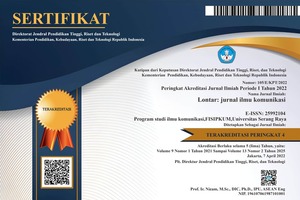MEKANISME KUASA DALAM FENOMENA MOM SHAMING PADA PERAN PEREMPUAN SEBAGAI IBU
DOI:
https://doi.org/10.30656/lontar.v8i1.2173Keywords:
Mom shaming, peran ibu, perempuan, kekuasaan, standarisasiAbstract
Permasalaham perempuan yang berperan sebagai ibu tidak terlepas dari wacana standarisasi ibu ideal yang ada dimasyarakat. Posisi perempuan dalam konstruksi sosial terkait peran ibu sangat rentan terhadap mom shaming. Tidak ada tempat aman bagi sang ibu untuk tidak dikomentari. Asumsi dari penelitian ini adalah setiap fenomena tidak terlepas dari wacana kekuasaan, termasuk pada perilaku mom shaming. Penelitian ini bertujuan mendeskripsikan mekanisme kekuasaan dalam fenomena mom shaming pada peran perempuan sebagai ibu. Landasan berpikir dalam penelitian ini menggunakan Teori Kekuasaan Michel Foucault. Metode penelitian menggunakan fenomeologi dengan pendekatan deskriptif kualitatif. Hasil penelitian menemukan bahwa standarisasi dibidang kesehatan, psikologi dan budaya menciptakan normalisasi tumbuh kembang anak, pola asuh, serta peran perempuan sebagai ibu. Normalisasi tersebut memicu efek panopticon dimana individu merasa terus diamati dan secara mandiri mengawasi dirinya sendiri dengan memastikan tetap ada diwilayah yang dianggap normal. Pengawasan tersebut juga berasal dari orang lain yang juga mengawasi dirinya sendiri, dan disitulah wacana kembali pada nilai dominan untuk saling mengawasi orang lain yang berujung mom shaming.References
Afiati, A. I. (2019). Mekanisme Pendisiplinan Tubuh Laki-Laki dan Perempuan Melalui Wacana Fitness di Situs Reps ID. Universitas Diponegoro.
Ahmed, E., & Braithwaite, J. (2005). Forgiveness, Shaming, Shame, and Bullying. Australian & New Zeland Journal Of Criminology, 38(3), 298–323.
Anna, K. L. (2018). 10 Langkah Menjadi Ibu yang Lebih Baik di 2018. Retrieved January 28, 2020, from Kompas.com website: https://lifestyle.kompas.com/read/2018/02/10/090000020/10-langkah-menjadi-ibu-yang-lebih-baik-di-2018?page=all
Ashari, R. G. (2018). Memahami hambatan dan Cara Lansia Mempelajari Media Sosial. Jurnal Ilmu Komunikasi, 15(2), 155–170.
Beauvoir, S. De. (2016). Second Sex : Kehidupan Perempuan. Yogyakarta: Narasi Pustaka Promethea.
Bresler, L. (2013). Knowing Bodies, Moving Minds: Towards Embodied Teaching and Learning. University Illinois Press.
Campos, M. N. (2007). Ecology of Meanings: A Critical Constructivist Communication Model. Communication Theory, 17(4), 386–410.
Fakih, M. (2013). Analisis Gender dan Transformasi Sosial. Yogyakarta: Pustaka Pelajar.
Fauzia, T. F., & Rahmiaji, L. R. (2019). Memahami Pengalaman Body Shaming Pada Remaja Perempuan. Interaksi, 7(3), 238–248.
Foucault, M. (1978). The History of Sexuality Volume 1 : An Introduction. New York: Pantheon Books.
Foucault, M. (1980). Power/Knowledge : Selected Interviews and Other Writings 1972-1977. New York: Pantheon Books.
Foucault, M. (1997). Seks dan Kekuasaan : Sejarah Seksualitas. Jakarta: Gramedia Pustaka Utama.
Foucault, M. (2002). Pengetahuan dan Metode Karya-Karya Penting Foucault (Edisi 1 In). Yogyakarta: Jalasutra.
Foucault, M. (2017). Wacana Kuasa/Pengetahuan. Yogyakarta: Narasi Pustaka Promethea.
Frye, & Bruner. (2012). The Rhetoric of Food: Discourse, Materiality, and Power. New York: Routledge.
Goodman, J. F. (2017). The Shame of Shaming. Phi Delta Kappan, 99(2), 26–31.
Goodman, J. F., & Cook, B. I. (2019). Shaming school children: A violation of fundamental rights? Theory and Research in Education, 17(1), 62–81.
Hamzah, A. (2020). Metode Penelitian Fenomenologi Kajian Filsafat dan Ilmu Pengetahuan (1st ed.). Malang: Literasi Nusantara.
Harususilo, Y. E. (2018). Mewaspadai Bahaya “Mom-Shaming†dan 5 Pemicunya. Retrieved January 18, 2020, from Kompas.com website: https://edukasi.kompas.com/read/2018/12/20/23041341/mewaspadai-bahaya-mom-shaming-dan-5-pemicunya?page=all
Haryatmoko. (2017). Critical Discourse Analysis (Analisis Wacana Kritis) : Landasan Teori, Metodologi, dan Penerapan. Depok: Rajagrafindo Persada.
Kumparan, T. R. (2017). Kasus Bullying Meningkat, Pelaku Didominasi oleh Remaja. Retrieved January 20, 2020, from Kumparan.com website: https://kumparan.com/kumparanstyle/kasus-bullying-meningkat-pelaku-didominasi-oleh-remaja
Lestari, S. (2019). Bullying or Shaming? Young Women in Patient Body Dysmorphic Disorder. Philanthrophy, 3(1), 59–66.
Littlejohn, S. W., & Foss, K. A. (2012). Teori Komunikasi (9th ed.). Jakarta: Salemba Humanika.
Markula, P., & Pringle, R. (2007). Foucault, Sport & Exercise. London: Routledge.
Moustakas, C. (1994). Phenomenological Research Methods (A Virding,). California: SAGE Publications.
Rahardjo, T., Dwiningtyas, H., & Pradekso, T. (2018). Komunikasi Penyesuaian Diri Kembali Pekerja Migran Perempuan yang Kembali ke Daerah Asal. Aspikom, 3(5), 817–832.
Rahayu, L. S. (2019). KPAI : Angka Kekerasan pada Anak Januari - April 2019 Masih Tinggi. Retrieved January 20, 2020, from Detik.com website: https://news.detik.com/berita/d-4532984/kpai-angka-kekerasan-pada-anak-januari-april-2019-masih-tinggi
Riva. (2018). Pidana untuk Body Shaming. Retrieved January 20, 2020, from Tirto.id website: https://tirto.id/pidana-untuk-body-shaming-tirtografi-danm
Santoso, A. (2018). Polisi Tangani 966 Kasus Body Shaming Selama 2018. Retrieved January 20, 2020, from Detik.com website: https://news.detik.com/berita/d-4321990/polisi-tangani-966-kasus-body-shaming-selama-2018
Thohir, M. (2013). Metodologi Penelitian Sosial Budaya Berdasarkan Pendekatan Kualitatif. Semarang: Fasindo.
Wakhidah, S. N. (2019). 3 Kesalahan Orangtua Ketika Mendidik Anak. Retrieved January 28, 2020, from liputan6.com website: https://www.liputan6.com/health/read/4001580/3-kesalahan-orangtua-ketika-mendidik-anak
Wibowo, S. (2018). Bentu-Bentuk Mom Shaming yang Sering Anda Dengar. Retrieved January 20, 2020, from Motherandbaby.co.id website: https://www.motherandbaby.co.id/article/2018/12/29/11362/Bentuk-Bentuk-Mom-Shaming-yang-Sering-Anda-Dengar
Widiyarti, Y. (2018). Memprihatinkan, Pelaku Mom Shaming Kebanyakan Orang Terdekat. Retrieved January 18, 2020, from Tempo.co website: https://cantik.tempo.co/read/1156628/memprihatinkan-pelaku-mom-shaming-kebanyakan-orang-terdekat
Widiyarti, Y. (2019). Mom Shaming, Efek Psikologis dan Pengaruh pada Pengasuhan Anak. Retrieved January 18, 2020, from Cantika website: https://www.cantika.com/read/1172314/mom-shaming-efek-psikologis-dan-pengaruh-pada-pengasuhan-anak
Winarso, I., & Lestari, R. R. (2019). Faktor Nilai Budaya yang Mempengaruhi Kesehatan Ibu dan Anak. Jurnal Perempuan, 24(3), 6–29.
Wulandari, D. (2012). Konstrukesi Pemberitaan Politik Ber-Isu Gender. Jurnal Interaksi, 1(1), 28–33.
Downloads
Published
Issue
Section
License
By submitting an article to the journal, the author(s) agree to transfer the published article's copyright to the journal, which will act as the publisher. This means the journal will have the right to publish the article in various forms, including reprints. The journal will maintain the publishing rights to the published articles.
In line with the license, authors and third parties (readers, researchers, and others) are allowed to share and adapt the material. In addition, the material must be given appropriate credit, provided with a link to the license, and indicated if changes were made. If authors remix, transform, or build upon the material, authors must distribute their contributions under the same license as the original.






